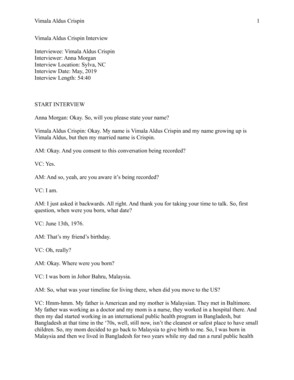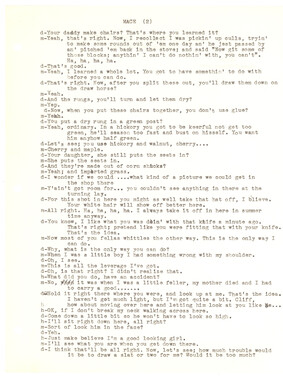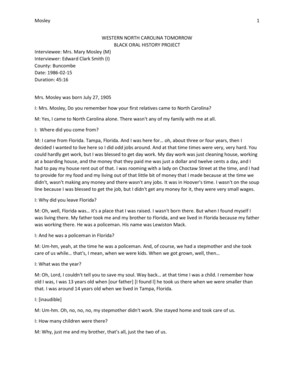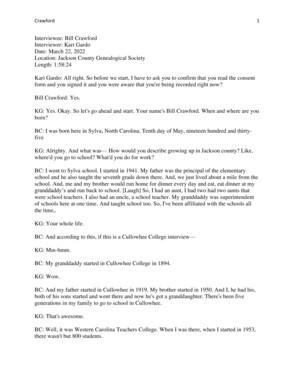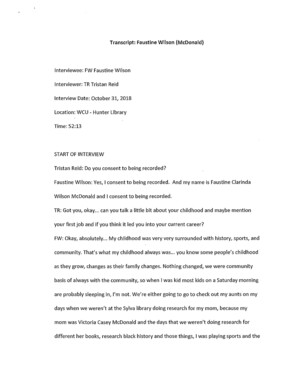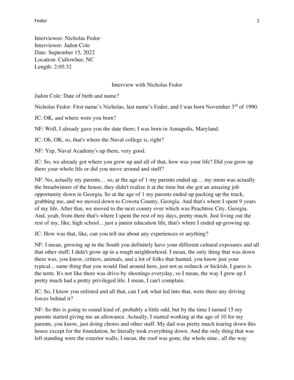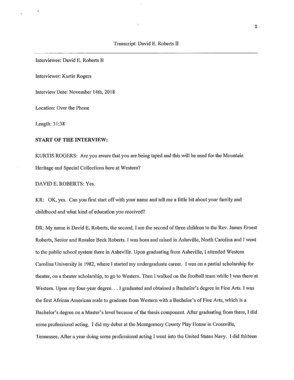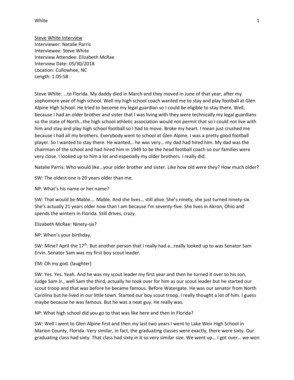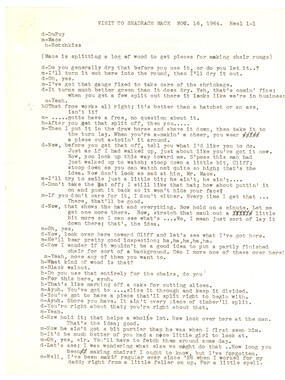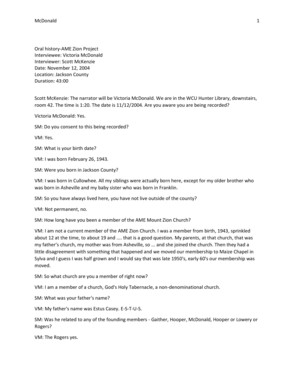Western Carolina University (20)
View all
- Canton Champion Fibre Company (2308)
- Cherokee Traditions (293)
- Civil War in Southern Appalachia (165)
- Craft Revival (1942)
- Great Smoky Mountains - A Park for America (2683)
- Highlights from Western Carolina University (430)
- Horace Kephart (941)
- Journeys Through Jackson (154)
- LGBTQIA+ Archive of Jackson County (15)
- Oral Histories of Western North Carolina (314)
- Picturing Appalachia (6679)
- Stories of Mountain Folk (413)
- Travel Western North Carolina (160)
- Western Carolina University Fine Art Museum Vitreograph Collection (129)
- Western Carolina University Herbarium (92)
- Western Carolina University: Making Memories (708)
- Western Carolina University Publications (2283)
- Western Carolina University Restricted Electronic Theses and Dissertations (146)
- Western North Carolina Regional Maps (71)
- World War II in Southern Appalachia (131)
University of North Carolina Asheville (6)
View all
- Allanstand Cottage Industries (62)
- Appalachian National Park Association (53)
- Bennett, Kelly, 1890-1974 (1295)
- Berry, Walter (76)
- Brasstown Carvers (40)
- Carver, George Washington, 1864?-1943 (26)
- Cathey, Joseph, 1803-1874 (1)
- Champion Fibre Company (233)
- Champion Paper and Fibre Company (297)
- Cherokee Indian Fair Association (16)
- Cherokee Language Program (22)
- Crowe, Amanda (40)
- Edmonston, Thomas Benton, 1842-1907 (7)
- Ensley, A. L. (Abraham Lincoln), 1865-1948 (275)
- Fromer, Irving Rhodes, 1913-1994 (70)
- George Butz (BFS 1907) (46)
- Goodrich, Frances Louisa (120)
- Grant, George Alexander, 1891-1964 (96)
- Heard, Marian Gladys (60)
- Kephart, Calvin, 1883-1969 (15)
- Kephart, Horace, 1862-1931 (313)
- Kephart, Laura, 1862-1954 (39)
- Laney, Gideon Thomas, 1889-1976 (439)
- Masa, George, 1881-1933 (61)
- McElhinney, William Julian, 1896-1953 (44)
- Niggli, Josephina, 1910-1983 (10)
- North Carolina Park Commission (105)
- Osborne, Kezia Stradley (9)
- Owens, Samuel Robert, 1918-1995 (11)
- Penland Weavers and Potters (36)
- Roberts, Vivienne (15)
- Roth, Albert, 1890-1974 (142)
- Schenck, Carl Alwin, 1868-1955 (1)
- Sherrill's Photography Studio (2565)
- Southern Highland Handicraft Guild (127)
- Southern Highlanders, Inc. (71)
- Stalcup, Jesse Bryson (46)
- Stearns, I. K. (213)
- Thompson, James Edward, 1880-1976 (226)
- United States. Indian Arts and Crafts Board (130)
- USFS (683)
- Vance, Zebulon Baird, 1830-1894 (1)
- Weaver, Zebulon, 1872-1948 (58)
- Western Carolina College (230)
- Western Carolina Teachers College (282)
- Western Carolina University (1794)
- Western Carolina University. Mountain Heritage Center (18)
- Whitman, Walt, 1819-1892 (10)
- Wilburn, Hiram Coleman, 1880-1967 (73)
- Williams, Isadora (3)
- Cain, Doreyl Ammons (0)
- Crittenden, Lorraine (0)
- Rhodes, Judy (0)
- Smith, Edward Clark (0)
- Appalachian Region, Southern (2393)
- Asheville (N.C.) (1886)
- Avery County (N.C.) (26)
- Blount County (Tenn.) (147)
- Buncombe County (N.C.) (1664)
- Cherokee County (N.C.) (283)
- Clay County (N.C.) (555)
- Graham County (N.C.) (233)
- Great Smoky Mountains National Park (N.C. and Tenn.) (478)
- Haywood County (N.C.) (3522)
- Henderson County (N.C.) (70)
- Jackson County (N.C.) (4692)
- Knox County (Tenn.) (21)
- Knoxville (Tenn.) (9)
- Lake Santeetlah (N.C.) (10)
- Macon County (N.C.) (420)
- Madison County (N.C.) (211)
- McDowell County (N.C.) (39)
- Mitchell County (N.C.) (132)
- Polk County (N.C.) (35)
- Qualla Boundary (981)
- Rutherford County (N.C.) (76)
- Swain County (N.C.) (2017)
- Transylvania County (N.C.) (247)
- Watauga County (N.C.) (12)
- Waynesville (N.C.) (68)
- Yancey County (N.C.) (72)
- Aerial Photographs (3)
- Aerial Views (60)
- Albums (books) (4)
- Articles (1)
- Artifacts (object Genre) (228)
- Biography (general Genre) (2)
- Cards (information Artifacts) (38)
- Clippings (information Artifacts) (191)
- Crafts (art Genres) (622)
- Depictions (visual Works) (21)
- Design Drawings (1)
- Drawings (visual Works) (184)
- Envelopes (73)
- Facsimiles (reproductions) (1)
- Fiction (general Genre) (4)
- Financial Records (12)
- Fliers (printed Matter) (67)
- Glass Plate Negatives (381)
- Guidebooks (2)
- Internegatives (10)
- Interviews (811)
- Land Surveys (102)
- Letters (correspondence) (1013)
- Manuscripts (documents) (619)
- Maps (documents) (159)
- Memorandums (25)
- Minutes (administrative Records) (59)
- Negatives (photographs) (5651)
- Newsletters (1285)
- Newspapers (2)
- Occupation Currency (1)
- Paintings (visual Works) (1)
- Pen And Ink Drawings (1)
- Periodicals (193)
- Personal Narratives (7)
- Photographs (12982)
- Plans (maps) (1)
- Poetry (5)
- Portraits (1655)
- Postcards (329)
- Programs (documents) (151)
- Publications (documents) (2237)
- Questionnaires (65)
- Scrapbooks (282)
- Sheet Music (1)
- Slides (photographs) (402)
- Sound Recordings (796)
- Specimens (92)
- Speeches (documents) (15)
- Tintypes (photographs) (8)
- Transcripts (322)
- Video Recordings (physical Artifacts) (23)
- Vitreographs (129)
- Text Messages (0)
- A.L. Ensley Collection (275)
- Appalachian Industrial School Records (7)
- Appalachian National Park Association Records (336)
- Axley-Meroney Collection (2)
- Bayard Wootten Photograph Collection (20)
- Bethel Rural Community Organization Collection (7)
- Blumer Collection (5)
- C.W. Slagle Collection (20)
- Canton Area Historical Museum (2110)
- Carlos C. Campbell Collection (198)
- Cataloochee History Project (65)
- Cherokee Studies Collection (4)
- Daisy Dame Photograph Album (5)
- Daniel Boone VI Collection (1)
- Doris Ulmann Photograph Collection (112)
- Elizabeth H. Lasley Collection (1)
- Elizabeth Woolworth Szold Fleharty Collection (4)
- Frank Fry Collection (95)
- George Masa Collection (173)
- Gideon Laney Collection (452)
- Hazel Scarborough Collection (2)
- Hiram C. Wilburn Papers (28)
- Historic Photographs Collection (236)
- Horace Kephart Collection (861)
- Humbard Collection (33)
- Hunter and Weaver Families Collection (1)
- I. D. Blumenthal Collection (4)
- Isadora Williams Collection (4)
- Jesse Bryson Stalcup Collection (47)
- Jim Thompson Collection (224)
- John B. Battle Collection (7)
- John C. Campbell Folk School Records (80)
- John Parris Collection (6)
- Judaculla Rock project (2)
- Kelly Bennett Collection (1314)
- Love Family Papers (11)
- Major Wiley Parris Civil War Letters (3)
- Map Collection (12)
- McFee-Misemer Civil War Letters (34)
- Mountain Heritage Center Collection (4)
- Norburn - Robertson - Thomson Families Collection (44)
- Pauline Hood Collection (7)
- Pre-Guild Collection (2)
- Qualla Arts and Crafts Mutual Collection (12)
- R.A. Romanes Collection (681)
- Rosser H. Taylor Collection (1)
- Samuel Robert Owens Collection (94)
- Sara Madison Collection (144)
- Sherrill Studio Photo Collection (2558)
- Smoky Mountains Hiking Club Collection (616)
- Stories of Mountain Folk - Radio Programs (374)
- The Reporter, Western Carolina University (510)
- Venoy and Elizabeth Reed Collection (16)
- WCU Gender and Sexuality Oral History Project (32)
- WCU Mountain Heritage Center Oral Histories (25)
- WCU Oral History Collection - Mountain People, Mountain Lives (71)
- WCU Students Newspapers Collection (1744)
- Western North Carolina Tomorrow Black Oral History Project (69)
- William Williams Stringfield Collection (2)
- Zebulon Weaver Collection (109)
- African Americans (388)
- Appalachian Trail (32)
- Artisans (521)
- Cherokee art (84)
- Cherokee artists -- North Carolina (10)
- Cherokee language (21)
- Cherokee pottery (101)
- Cherokee women (208)
- Church buildings (166)
- Civilian Conservation Corps (U.S.) (110)
- College student newspapers and periodicals (1830)
- Dams (94)
- Dance (1023)
- Education (222)
- Floods (60)
- Folk music (1015)
- Forced removal, 1813-1903 (2)
- Forest conservation (220)
- Forests and forestry (917)
- Gender nonconformity (4)
- Great Smoky Mountains National Park (N.C. and Tenn.) (154)
- Hunting (38)
- Landscape photography (10)
- Logging (103)
- Maps (84)
- Mines and mineral resources (8)
- North Carolina -- Maps (18)
- Paper industry (38)
- Postcards (255)
- Pottery (135)
- Railroad trains (69)
- Rural electrification -- North Carolina, Western (3)
- School integration -- Southern States (2)
- Segregation -- North Carolina, Western (5)
- Slavery (5)
- Sports (452)
- Storytelling (245)
- Waterfalls -- Great Smoky Mountains (N.C. and Tenn.) (66)
- Weaving -- Appalachian Region, Southern (280)
- Wood-carving -- Appalachian Region, Southern (328)
- World War, 1939-1945 (173)
Interview with Walt Worek
Item
Item’s are ‘child’ level descriptions to ‘parent’ objects, (e.g. one page of a whole book).
-
-
1 TRANSCRIPT: WALT WOREK Interviewee: WW WALT WOREK Interviewer: SH Shane Hamby Interview Date: November 10, 2018 Location: Cashiers, NC Length: 1:32:46 START OF INTERVIEW Shane Hamby: Where were you born? Walt Worek: I was born in Philadelphia, back in 1964, so I'm a spry Fitly-Four years old. SH: What did your parents do for a living? WW: My dad was a deputy sheriff; my mom was self-employed as florist. SH: What other jobs other than this one have you had before? WW: I was a debt collector; I worked for the state of Pennsylvania as a health care worker for people with developmental disabilities and I've always DJ'd, I've always been a D.J at heart. It got to the point I was getting close to retirement with the state and I said, "ok let's do it" and answered an ad for the club I'm at now and been there since I retired from the state about ten years ago. SH: Do you think any of those jobs helped you in your current job'' WW: Yea, I think they actually did because I got exposed to different cultures, different music. All those cultures, I mean if! got to work with Latino's I got to learn their musical taste and what was hot for them at that time and period. Or, country music fans or R&B fans or rock fans. It was just this whole melting pot of ethnic music that just really, goes back. And I'm kind of a military historian, and I was just watching the Elvis Presley "True Searcher" documentary on HBO. And they were going through like the early days of his learning to do music back in Memphis. And they had clips of like Howling Wolf and all these great blues and rhythm and blues gospel groups from back in that time. And I was like Holy Cow where did they find these videos at? Really very interesting documentary. It just hooked, especially when they started showing Howling Wolf and I was like, Oh My, I mean just like I said just wanting to be that "back" historian of music. How music comes about and these cultures inte1twine, it was just like "Wow". SH: Do you consider what you do a job or a career? WW: Wow, you don't mess around do ya? Actually it's a career. I find it a career. A job is something that you do and you don't feel any love or joy for it. Where a career is like, you have that love for it. You want to know more about it. When you lose that fire, then that career becomes a job. And a lot of people think a job becomes a career and it's actually in reverse. SH: Do you think jobs or careers, either one can help you achieve goals but at the same time take away your dream? WW: I don't think so, I think you have to take your dream and make it fit your career and still have that fire and that desire to make that dream come true, through your career. SH: What do you think it takes to be successful as a strip club DJ? 2 WW: Be relevant. Stay relevant. What I mean by that is, musically. Don't be so close-minded and put yourself into one format of music. Whether it be rock or EDM or R&B or what have you. You gotta be a "(5:20)" format guy. You don't have to like all forms of music but you have to be willing to accept all forms of music. SH: And does that go both ways with people also? WW: Oh, definitely, you have to be open-minded. You can't be so closed minded. It's amazing how, as a strip club DJ, you see a lot. You have to be openminded, and you look the way our country and at one point the country was so closeminded that they didn't accept someone being a strip club DJ. Now, a strip club DJ is acceptable and the close-mindedness comes in with I'm a democrat I'm a republican, I'm this I'm that like everybody wants to draw a straight line. If you're going to draw a straight line that's where the divides come in. SH: What do you think sets you apart from other strip club DJs" WW: Personality, I think. The one thing that I found out, being a member of PANDA (Professional Adult Nightclub DJ Association) is we; they have an exposition out in Las Vegas every year for the strip club industry. It's the Exotic Dancers Publication Exposition. And this was my first year attending so, I got to meet a lot of the other, I was put into PANDA about eighteen months ago. I finally got to meet a lot of PANDA's. I mean we have forum on Facebook and we talk about music and we joke with each other and we bust each other's chops. It becomes a family; it becomes a brotherhood a sisterhood. And that really doesn't come full circle until you actually sit down to meet who you been talking to, like face to face. And it amazed me that, what I found was, to every man or woman to a DJ that I met ant at Expo this year was a lot like me. I mean I thought I was like, I am doing the right thing, am I too goofy, am I too personable, too far out there. But then when I met all the other PANDAs and met them in a social environment and really that's what we work in a social environment. I found out that I'm not alone. And these guys are just as crazy as I am. And when you meet DJs and managers that have been in the strip club industry twenty or thirty years and they're just as wild and crazy today as they were from day one. And you sit down and talk to them and get to know them as friends, it really does help, me personally, in my shifts where I'm at cause sometimes you feel so secluded and you're in your own little bubble. But then my bubble's the same as Stacey's bubble or Wild Bill's bubble or ''(9:05)" bubble or whoever. SH: Are there female DJ's and is the perception different for them in such a male dominated job? WW: As far as the PANDAs go, I mean we do have female members. And I'll put them up against any other DJ in the country. They're just as good. They come at it from a different perspective. Where we're coming at it from the male's perspective, they come at it from their end, seeing it as a male. Where when I'm at work and I see couples, I'm a male trying to look at it from a female perspective and make the dancers as much money as possible while up on stage. SH: Describe the club you work at, do you work at one or more than one? WW: My main strip club is called Savannah's on Hannah, its outta Harrisburg, PA, which is where I currently reside. I've been there about eight years. It's probably, square footage, I really couldn't tell ya. We probably do oh, seventy to hundred people on any given night. SH: Is it middle upper scale type? WW: Oh we're definitely upscale. There's a dress code, I mean people come out dressed, they're coming out for a good time. They're not going too, Joe's Bar and Grill where they have a little stage 3 and trail mix on the bar. This is full service dinner, not only the floor hosts and the bouncers and managers and servers. I mean they do surf and turf, they do salad, burgers, it runs the gammet, full kitchen, full stocked bar, upper and lower shelf. Bottle service of course, champagne rooms, lap dance rooms which is pretty much basic anywhere you go. We have a side room, where we hold live events. We have live bands, and every once in a while they let us partake a DJs so that's always a plus. SH: On the more lower scale end of strip clubs, would your job be different? WW: Oh most definitely. I think it would be more different. My DJ booth at Savannah's is thirty feet in the air, it's like a craw's nest, and we call it. I'm thirty feet in the air, I'm overlooking the crowd. We got tons of security on so if anything were to pop off on the floor I'm not even involved. Where if you're at Joe's Bar and Grill, the DJ’s probably the only security or the DJs at the door collecting money and doing the f1oor host job, doing security. Kimberly's got to be onstage and he's got to hunt her down. She's somewhere around and he don't know where she's at. It takes away from what you're really there to do. And what you're really there to do is be the party host. Take that party on a journey musically and create those memoires for the next time they come. SH: Do you think being a strip club DJ is a reflection of who you really are or would people view you different outside of work? WW: I don't think anybody considers me any different. My families already open. My dad and my mom, my wife, they really have "you're a DJ" that's what you do. You just happen to work in a strip club. And that's where I think back in the history, the late eighties early nineties, there was that stigma. Where their perceptions are changing to the point that, being a strip club DJ is not like you're not going to get gangrene if you shake hands. SH: What are any stereotypes or misconceptions not only about your job but the industry as a whole you'd like to clear up? WW: The one misconception they feel about strip clubs is it's just a big orgy and the girls are prostituting themselves and the DJ's banging every waitress and dancer. Nah man, we're there to do a job. We're there to perform for you. We're there to perform for the public. And that's where it ends. When I'm outside walking in I'm Walt, I got my laptop on my shoulder but when I open that door I become DJ Skorpion King. Everything else is outside. I leave that there. I come in now I'm this persona. I'm here to take you on a journey, get ready and keep your arms and legs inside the ride at all times until we come to a complete stop. SI-1: How do you view your role, the girls’ role and the customers role within the club? WW: My role in the club is basically create a music soundtrack. And when I say that, I'm gonna take Steve and Carrol who coming into the club, it's Saturday night and they're out on date night, they been married or twenty years. And they come in gonna have a couple drinks. You wanna create those memories, you wanna take the music and say ok well, there's this couple that's mid to late fortyish. And from my perspective up in my craw's nest I can see what's gonna going to work, what's not gonna work with the open format like my club is. I might start playing a Brittany Spears song and she starts boppin' her head and they start boppin' their head, and that's about the time they start spending money you're like ok. Now they start spending money, they're creating energy in the room. So, I'm gonna take that energy off of them and my dancers are gonna see that energy, they're gonna perform harder up on stage because now they're making money. So I now I got the bar staff involved they're bouncing around, the servers are bouncing around, the floor guys are boppin' around. It's all creating this energy and we get this big ball of energy and I've did my job. Now the dancers are 4 gonna take their energy, they're gonna put it into their stage performances. They're gonna make money on stage, they're gonna get that lap dance from them, they're gonna get that champagne. They're gonna hang out and make a lot of money. The customers come in now the see, I got this bachelor's party walking in the door, they see all this energy, they're ready to party anyway, now they're amped ten thousand percent, they're gonna have a really good time. And it just circles around, it starts with the customer and it just permeates the whole building. SH: What's the difference between an average guy coming in for a dance and the regulars? WW: Ok you're coming in my club for the first time, you're gonna get a dance, watch the girls on stage you're like hey it's great time it's a party. Which is wonderful and that's what we look for. But at the same time we can't survive, realistically on just those ones, we need those regular customers to come back. That's where the dancers come in because they cultivate those regulars. Say you come in, Kimberly's on stage; you kinda take a liking to Kimberly. You're like, when you working again, now you're coming back to see Kimberly. And you're gonna keep coming back to see Kimberly. Wait a minute here's Anastasia now I'm gonna see two of them. Now you become a regular. The regulars that we do have are VIP members; we have two levels at my club gold and platinum. They pay a pretty penny to be VIP member so they have perks, free admission; they get to bring a guest in. We have different events throughout the year just for VIPs. They support the club they come in on a regular basis; they're spending the same money, for food and drink, buying the girls something to eat or buying them something to drink. It just helps having those regulars cause now you have a base to go to. SH: Do the girls market themselves as a brand? WW: Oh most definitely. It's the same for DJs. We are not the draw, the DJs arc not the draw, the girls are the draw. You can run strip club without alcohol, food, realistically you could run a strip club without a DJ. You get one of these automated systems, which believe me you don't want to do; you lose that personality that personable experience. Systems can't go down on the floor and shake hands with your regulars or VIP members and shake their hand and you know their music. You know what they like to hear. And you're going to keep them there. You can run the club without anything, except one thing and that's dancers. And the world of social media, it's a benefit for the dancers to create that brand, same as a DJ. It's a persona, it's a different person. SH: How has the role of social media changed your role or the girl's role? WW: Oh, pre-Facebook, pre-websites, I mean you if you don't have a website, a Facebook page, Instagram page, snapchat, twitter, what have you. I'm forever on social media. God bless my wife, she handles my social media for me the outside. I just don't have time, between downloading music, working on getting my voice overs done, working on new music. There's so much side work that I have, I'd need twenty-seven hours a day to do everything. The technology today, everybody's got a mini computer in their hand. You've got an iPhone, I've got an Android, and everybody's got these smart phones. Information flies at the touch of a screen or click of a mouse. If you're not going to brand yourself, then you're really hurting yourself, as far as getting those regulars to come back to visit your club. It's like oh Kimberly's working and Walt's working I'm gonna hang out, it's always a great night when those two are on. And that's where the marketing comes in at because the dancers can have an Instagram page. "hey don't forget, I'm working tonight at Savannah's, come on in have a cup of tea. My club just reinvented the website where it's now interactive. When dancers come in they have to have a profile on the website, meet the entertainers, they can check-in, they can post their schedules. So you always know what's going on. 5 SH: How do you think a male's perspective from the scholarly aspect be viewed, do you think it would be viewed less insightful since most of the work done on this subject is by women? WW: I think because the industry is more female driven. All my bartenders are female. All my entertainers are female. One of my managers is a female. My general manager is a female. My owner's wife gives him tips on how to decorate. Or finds a painting that would be really cool in the club or "why don't you check this out". From the male perspective, it's really hard because it's like a guy going "hey I saw a great set of tits". And that's not the industry, males think on a way different wavelength than females do. If a guy came out with a book or dissertation on the strip club industry the publics first thought would be he's trying to take advantage of the girl. Oh he did these interviews just to get in her pants. It's still that old stigma of the dirty old man with the overcoat. SH: What if I was interviewing male strippers would a male's perspective still be hard to get or would women still be the one's overall being talked too? WW: You know I think a female perspective honestly, cause I don't think, I've worked a male strip club before, I did a couple fill ins, I'm not really well versed in it but I can see it from both sides of the coin. At the same time you're gonna get the female perspective of the club as this; they're more in tune to aesthetics. Whereas opposed to whoa she's hot. So even if a female were to do a dissertation or book on the male dancer, which basically you don't have very many strip clubs for females. The male review has to come to town. I know in Atlantic City one of the hotels down there, they have Primal Heat, I think it is but it's a nightly show, like Vegas The Thunder from Down Under. But it's a show, if you could make it work where it's a sustainable business model I woulda done it. That's where you see so more strip clubs that feature female dancers cause males are more primal as far as visual gratification. SH: Has your view of masculinity changed since working in the strip club industry? WW: I would say no. To the point that' again you have to have that open mindedness. I know these dancers are here and they're here to make money. And that's what I'm gonna do I'm gonna help them. I'm not pimping them out; I don't ever get that feeling. I'm guns, tanks, military, I'm 100% male. But at the same time after working in this industry you tend to, well maybe lose a little bit of masculinity, when it comes to your interaction with work. I look at them more like a sister, where I'm there to help them but I'm also there to protect them. Where there not, the typical male that's their next conquest. SH: The girls say they see men in their most vulnerable state, do you think that's true? WW: Again, yea I think it is. It's because you wanna go someplace where you have, an interaction, a social interaction with another human being. So much interaction today takes place over these smartphones, and computers with Facebook and Twitter. It's not like the old days when you went out to a club, maybe not a strip club, and you go out dancing go out to dinner. Where now it's to the point where you know Kathy wants to go out with you what's your Facebook, let's stalk your Facebook. A lot of the clientele that we have is older and when I say older I'm not talking like geriatric, late 20 thirties to early fifties. We're in the area of the capital of Pennsylvania so we get a lot of, like I tell all my new dancers, when they fill out their dance card or music card it's think fm1y-five year old state worker golfer. That's our base clientele. With the economy and everything you get a lot of people that move for jobs, career, what have you. They don't have family or their families are in California and they can't make it out or they don't have the vacation time, whatever. The strip club kinda becomes like their second home where they have friends. And they don't feel that deep dark loneliness. That's where the vulnerability comes in at because they may not have family or their kids are grown and they've moved away or they're divorced or whatever, going through a nasty divorce. There's a whole 6 lot of components there but this. way they can go to the club and have the dancers and they don't feel as vulnerable anymore. They have somebody they can talk to. SH: Do you think the customer or client discovers a little more of who they are as a person when they come or do you think they're trying to escape who they are when they walk in the door? WW: I think it actually helps build their self-esteem. I can tell ya for a fact I have one customer that comes in, he's fairly regular, I don't want to say he's an every nighter. But on Friday or Saturday night he'll come in and I know what he wants to hear. I know certain music he wants to hear. He constantly tries to tip me and I'm like "no". Keep your money I got you don't worry about it. I got this covered. Also he's known to a couple of the dancers, even if he doesn't come up to see me in the booth, I’ll get one of the managers to help come bring him up, "Hey how ya doing?" Or if I see him on the floor, if I'm shooting down to grab a soda or go the bathroom, because we don't have facilities up thirty feet in the air, I wish we did. It'll be the end of the night, I'm done waiting to get paid, "You really made John's night tonight he had a great time". It made him feel better, you can see it in the face of the regulars, I see it in the face of the regulars I know, or VIP members I've gotten to know throughout the years. They could be sitting there and I walk in the door, say I'm working night shift, and they're there for happy hour and sitting there and turn around, "Oh my God Walt's here Yea! Hey Walt how ya doing let me get ya a beer". I'll be like relax chill out I'm in there to do my job. You can just see their expression change, a hundred and eighty degrees. SH: Do you think there's another place they could go to get that feeling? WW: Honestly as far as the interaction goes, I know how I feel. I used to be on the road when I was DJing. Back in '95 I went through a divorce. I was working for a company outta Nashville called Williams Bell Agency and they had a contract with Interstate Hotels, so it was like "( 40: 17)" and Hiltons, it was a big conglomerate outta Colorado they had hotels all over the place. And they were the DJ contract. So I would go from three months here three months there, six months here bouncing around the country. At the point, I know how hard that is to become, you don't want to create that relationship, so it's kinda hard like, "man I'm really down, I'm off tonight, I don't wanna go downstairs, I don't wanna be around the same people I work with". I wanna go out, soya try to find a local spot to hang out, maybe sports bar whatever. It's difficult even as a DJ, you go in you go right into DJ mode and it·doesn't always filter in. But you walk into a strip club, you have that person talking, "hi how ya doing what can I do for ya". It's a whole different front level cause you can go to any other place and get that but it just seems like, its more genuine. May that's not the right word but kinda more on a genuine basis. They get to know your name, they get to know your drink, they get to know you. Then it becomes that genuine that personable and you feel more comfortable. SH: How do you see the future of the business going? WW: Good question, that's an ever evolving question. Personally, I'd like to see it continue and evolve. But the realist in me sees what's going on and this industry follows the economy. You can tell when the economy is going go to a downturn by the lack of people in the strip club. Because you don't have that amount of disposable income. You can go into a sports bar, sit down and watch the Bills and Patriots and have couple beers and some wings and roll out. Whereas, in the strip club industry, you can go into the strip club watch the Bills and Patriots, have a couple beers have some wings tip the dancer, get a lap dance and then roll out. That's where that extra disposable income comes in at. So the less business there is in a strip club, you can see the economy start to go to a downturn, but then start to pick back up again. It's a constant wave. As far as where the industry's going, Millennials are very tight with a buck. I see studies, I've read articles, you can see it, not only do I work in a strip club but I also work at a dance club. You can tell who's there to have a good time. 7 You can tell basically what generation they are by people on the dance f1oor. The GenXer's the Baby Boomers they're out there out they're partying they're having a good time. What are the Millennials doing sitting there, especially the females, sitting there with their cells phones out texting while they're swaying back and forth taking "duck face" selfies. I mean the industry will always be there but is it gonna be the form that it was back in the early days, or the heyday's of the late eighties, early nineties where it was massive clubs and massive amounts of money being spent. I don't think we'll ever see that again and honestly I see the strip club D.J. being phased out. I really do as much as I hate to say it, more and more and more, and once again I'm going back to Expo out in Las Vegas, there were two or three, I think there were two that had automated DJ systems. SH: That's crazy, cause all the girls I've talked to love the DJ, Stacey equated it to being the quarterback. WW: Yea, that's a great point Stacey made, yea we're a quarterback, we, it's kinda of funny, I turned around and me and Stacey kinda think the same way, where if! get a new dancer come in, I'll tell them, "don't blow my stage, that's my stage, it's my music." Don't blow my stage and let me do my job and we'll get along just fine. And they can tell where I get to a point where, alright you pissed me off now. My dancers have a sense of "oh shit I've pissed Walt off." And they won't come out and say it but they'll say I'm sorry on the stage, or whatever and then all's forgiven. But they can tell in the middle of a shift where and maybe it's not them, maybe it's somebody else. And I have a few of them that are just so in tune with just how I work a shift, they'll call me on the phone from the dressing room, "hey you ok?" Yea I'm fine I'm fine I'll make sure I'll take care of that. They're kinda like our bouncers. Which is actually kinda funny. I have one dancer in particular, who basically one Saturday night, I'm sitting down on the floor, I shut everything down, I turn my radio in. I'm just sitting there waiting to get paid, I'm talking to the bouncer, shooting the shit. And I could hear her from the dressing room, "I'm telling you now you ladies need to start taking care of these DJs or we're not gonna have many more, these guys kick ass every night and the spend all this money on clothes and music and you guys better start showing them some appreciation or we're gonna lose who we got. We got the best DJs in central PA." She's just going off totally. And I'm like Wow, somebody actually got it. Somebody actually understands what my job is. I've always said when we got new dancers in and in doesn't matter any club, you can take Penthouse Club in New Orleans, you can take Cheetah's in Atlanta, you can take Stacey's club you can take Alicia's Cabaret in Ohio, or Scores in New York, Tampa Gold Club or Centerfolds in Las Vegas, you can pick any club at all. I believe this to a fact, dancers don't know what the DJ does on a nightly basis. What they should do is take a video, stick a DJ up there I don't care if it's your number one, number two whoever. Stick them up in the booth, take the camera stick it in there and the rest of the guys call on the phone get on the radio, show what we do up there and why we get stressed out and how we handle it, then maybe you get an idea. SH: Talk about some of the stresses of the job. WW: A lot of it comes from the dancers, as far as my club goes. Where he wants it driving, he wants that Las Vegas thump thump thump, that high energy. I got my hair on fire and two dancer rotation on the main stage, dancers going into the special events room cause we got a band in there. I gotta show coming up at 11:00, I got big UFC fight or my executive lounge is full, I'm running dancers up there, so I'm running like a five dancer swing and it's midnight and we're cranking and it's a great night. We're blasting girls are making money, champagne is going nuts. And then the phone rings and "can you play "Acquainted" by the Weekend. That will set me off, my stress just went from I'm the happiest mother, to YOU WANT WHAT and your switch is like hundred and eighty degrees. 8 Or same scenario and you're rocking and rocking and you're calling for this dancer and we forgot to call her in champagne, well let's see thanks a lot guys. You just blew my stage. That's what a whole lot of the stress comes from is, we're there to facilitate the show on stage, don't mess up our show. Even though they're not there to see me, I'm kinda like the Wizard from the Wizard of Oz. Pay no attention to that man behind the curtain. I'm orchestrating everything I'm the puppeteer. I'm orchestrating the stage, I'm orchestrating where to send the floor guys, or crap I see something that looks like it's gonna pop off at the back bar or could possibly, be into something so I'm telling the bouncers hey guys get over there. Or telling the managers who's coming up "hey you're doing a great job", so in so here, so in so there. I'm always keeping an eye on everything. Like I said I'm kinda like the Wizard from the Wizard of Oz, that's kinda how I look at it. It's amazing when you talk it out its like wow it's certainly true. SH: How do think the #Me Too movement has or will affect the strip club industry? WW: It's actually already starting to affect it a little I think. I think a lot of the "younger" dancers; I'm talking like under thirty, that 18 to 25 age range. Working in a very sexually charged industry, and you're going to get those snide comments from customers. It's all in the perception how you perceive a statement. I think some to the Me Too movement has sort a kinda backfired, it just seems like in this country we go from you can't say this; the PC has just gotten ridiculous. It's never so prevalent than in the industry we work in because, of what the industry is. In our club we actually have a sexual harassment policy. Every once in a while I just think about it, have we gotten so bad as a society that this is the industry we're in but we have to have a sexual harassment policy? It's kinda an oxymoron almost, but legally you have to have it. It's like you can have peanut butter but it has to be Skippy. It's just kinda strange how things get and with the Me Too movement it gets super, its good, but it gets to the point of that militant point. People get too far into it, like this yahoo from Florida that was mailing out bombs. It's a great example yea you support the President, but you don't sit there and send bombs to Barrack Obama and Bill Clinton and George Sorros. So what if you don't agree with the politics what gives you the right to do that. It's kinda on the same lines where that militancy or that radicalism comes in at. It's where people take the message to the extreme where it didn't necessarily need to go or wasn't intended to go. SH: Most of the girls refer to themselves in some other name other than stripper, like dancer or entertainer, do you think stripper has a negative connotation? WW: In some forms of society yes, I think there's still that oh you're just a stripper and if it's entertainer it's a little more acceptable. Look at all the clubs that are out there, I challenge you to find one that says, Shane's Strip Club, no it's Centerfold's Cabaret, The Gold Club, The Tampa Gold Club, Savannah's on Hanna, A Gentlemen's Club, Scores: A Gentlemen's Club. You're gonna be hard pressed to find some place that says Shane's Strip Club. And it's all public perception. In some circles, if they're talking in the back, like you're just a stripper, it's all busting chops. But in "Polite" society, the stripper word has that negative connotation. SH: There's a book Burlesque West about strippers in Canada, Vancouver in particular and they girls there dance for salary, but there was a chapter called, "Everyone wants to date a stripper but no one wants to marry one" why do think that is? WW: Very True. Again it's the public perception. But it's interesting you brought up Canada and I may be going back to a previous question about where we see the industry going. I would say probably a good, I don't know the statistics maybe you could look them up, I haven't done the research on it, but I would say 80% if not more of the strip clubs have an independent contractor business model. What's going to help the industry and again you're gonna get this I call it Jail House 9 Lawyer effect. They'll read over there lease agreements, whether it be stage lease, locker lease, oh you can't tell me when to work, and you can't tell me what to do and you can't tell me to do this and the problem, it's been pretty prevalent there's a great podcast, if you want some really good information on this, done by Tim Rhodes he's a good friend and a PANDA, called Strip Club radio and they did a whole segment on the show about independent contractors if it's still a viable business model. To be quite honest with you, make the dancers employees because, if you look at the dancers at any gentlemen's club they're thirty-two and under. There you have your millennials they grew up with computers in their room and the best of electronics and the parents with "oh not my Johnny". They've been handed everything and parents did their homework for school and help sell candy for candy drives, they've been handed everything in life, "you can't tell me what to do." But then you get people like me and Stacey that grew up latch key kids we had an Atari 2600, hell you were lucky to have a Goddamn clock radio in your bedroom, if you had your own bedroom and not share with brothers and sisters. Our end is we work. This is when I work, this is my job, this is got to get covered come hell or high water I'm gonna be there. The younger generation today which is the primary number of dancers is, "Well you can't tell me what to do, it doesn't say that in my contract." I think the owners need to look at their business models and start making these dancers employees. Where you can set their schedules and what they need to wear on the floor, and these are your hours. As opposed to having a locker fee. I think that's where a lot of the stuff you see in the papers like the Gold Club filed bankruptcy comes from. How do you file bankruptcy? Because you don’t have those lease fees if you don’t have dancers, you don’t have customers. If you don’t have customers, you can’t keep the lights on and then you’re filing for bankruptcy. That’s the danger of that independent contractor business model. SH: Do you think the girls want to stay independent contractors because the work ethic sucks with Millennials or do you think they would consider becoming an employee in some way taking away the power they have? WW: I think it's a sense of entitlement. They're eighteen, they get pregnant then they can go to the state and get food stamps and WIC. They're getting a handout not a hand up. Then they're not working for their money. They love to use the term work, but on their terms, but here's the thing. You consider it work or a job then you need to start showing up. "But my contract says I don't have to do that". Where if you make them employees now they gotta start reporting their income. Uh-oh. There goes the assistance; there goes this or that being handed to them. And then they gotta start claiming their tips. On top of that they gotta file taxes. Which to a man all strip club DJs file their taxes. And I'm an independent contractor; I get paid cash every night. My record keeping, God Bless my wife, she keeps great records. At the same time with the dancers, we're talking 18 to 30 are like "I made 400 dollars; I can go spend 800 dollars at the store". Oh, then I gotta go to work the next night cause I need more money. I make a fairly decent living. Put it this way my wife doesn't have to work. I have three vehicles I have a house. One vehicle is a 1999 Jaguar that I been restoring. That's like my hobby. But I still have my house payment, my car insurance. They like being an independent contractor, because there isn't all that additional "adulting". There's a good word "adulting". Now some of the older ones, they do pay their taxes; they do take care of stuff They're doing it above board, and don't have to work as much as the younger ones do. Which is truly amazing. SH: Do you think that comes with wisdom or is it just the age we live in now? WW: I think it's the age that we're in. The 18 to 30 years olds, I hate to keep bashing on them but they've been handed everything, all their lives. I know it sounds like a stereotype but you see it. We're not telling stories outta school. My wife has pulmonary fibrosis she can't work and my boss and mangers are like you need time off just let us know. 10 SH: Are there any shared experiences or conditions that strip club DJ’s have? WW: I think we all have the same general issues. It's kinda even keel. It doesn't matter if you're working a country format, or open format or the format is rock. You still gotta hunt music; you still gotta break new music. That's why I love being a PANDA; we get all types of great new music. Very good supporter of PANDA and really been helping us out, Bob Suprealli, he runs stipclubmusic.com. He's the CEO of Concrete Marketing, he's always on our podcasts, the PANDA Off the Charts podcasts. There's all types of great new music they break, him our secretary and another one of our board members. The two board members are actually Exotic Dancer Publication 2016-17 D.J.s of the Year, which is a really big deal, Damion and Lon are great guys. I don't think a lot of people realize what we do on the backside when we're not out in clubs. We still have lives, and wives, and we gotta go grocery shopping, pay the bills and try to break away for a vacation. Honestly a lot of the DJs ain't on salary, but we're considered employees of the clubs. We just don't have all those benefits of a salaried position. Scheduling time off, for me to out to Las Vegas, I had to switch two shifts around and it was a royal pain. I had to work on it for six months before I got it locked in. Give the GM a letter and say this is what's going on at Expo and I'll be out there. Scheduling time off or dancers don't tip out or they're very needy. Seriously two bucks ain't gonna kill ya you made three grand. Case in point, I have one dancer that'll come in on Friday, she works two Fridays a month. She's one of our original dancers. She's marketed herself inside the club; regulars come in just for her. She'll be there from 12 o'clock noon to 11 o'clock at night and she will not see the stage once. She's in champagne, but my tip out is my flat fee. And if! told ya how much she makes in that 11 hours ... $2200 in 11 hours. And she pays me ten dollars. That's all she has to pay, she doesn't have to pay a house fee because she's a day shift girl. SH: Do you think people that you may encounter outside the club only see you as the strip club DJ or the girls as strippers? I mean, do you think they forget you have lives outside and are regular people? WW: I work a dance club about 45 minutes from here, every once in a while. I wasn't getting a lot of shifts so I took another slot. But I always schedule around from when I'm off, so it doesn't conflict, my owner knows, my GM knows. If it's a Saturday night and we're having amateur night and it happens to be my night off and they want me to come in and run the show from the floor. So I go in do my two hours and I leave. But I don't schedule the other club, and they're very well aware that Savannah's is my home that's where I make my bread and butter and pay my bills. But I've had people come down from there on a Saturday night, Friday night and arc like "oh my God that's SK". I know that voice they'll start waving from the floor. My wife and I were out at our local casino about ten minutes away. Happened to have the night off where I didn't have to do anything, we ran over there and I ran into one of our VIPs. We sat and shot the crap about the club. She was like "he really likes you" and I was like yea that's Frank he's a tattoo guy. My area ain't a major city like New York, it's a bunch of little towns but you don't run into anybody, it's kinda weird that way. Like when I was DJing Philadelphia would run into people left and right. We we're on the boardwalk in Atlantic City and this guy come up shook my hand, "man you're great". I was like alright buddy see ya later, who the Hell was that, I have no clue. SH: If you could have one other job what would it be and why? WW: You know what there's absolutely nothing else I'd want to do. I done pretty much everything I've wanted to in my fifty-four years on this big blue marble. The one thing I'd like to do, actually two things, one would be headline Las Vegas. And be on the lineup of one of these music festivals. If it's involved with DJing I've probably already done it. I've played funerals, I've played baby shower, 11 community events. a small festival in Atlantic City, doing the DJ Expo out there which we haven't done the last three years cause the Taj Mahal closing and going bankrupt so we lost our contact there. SH: How do you DJ a funeral? WW: It ain't easy. The funeral lunch afterwards. It was weird, it was in Philadelphia, it was one time. It was one of the local bars that I worked at and the owner passed away. He really loved me and he wanted me to be the music at his luncheon which was at the club. They had the one area set with food and people could come in and think and talk about him and hear memories. It was basically background music and I left the mic open. After everybody was done eating and shooting the crap I invited people up to the mic to see if people wanted to tell stories. It was like being a talk show host, it was a different experience. As far as music it was just background nobody was gonna dance you knew that going in. This is the days before the internet so you had to research you had to start talking to people or you were SOL. Not like you could Google up How to DJ a funeral. I think that was probably the weirdest gig I ever did, in my thirty seven years of doing this. SH: Is there anything else you want to add to the interview or anything you think I've left out? WW: I mean the business model that we talked about a little bit might be a good question for DJs and the dancers. Expand on that especially as far as the dancers go. Why is independent contractor better than being paid salary? And see where they take that. As far as on the DJ side I would say you pretty much nailed it. As far as technology goes, technology can help us or it's gonna hurt us. Where other DJs think that technology's gonna go, whether it be showclub VIP or cover jock it just keeps getting bigger and bigger. Owners are getting more and more tight lip up at the same time, you might find some guys that are coming from or had that in there. I know there's some clubs out there that utilize one of these automated programs on day shift. Which is a little slower primarily. How does it help them for that particular shift as opposed to a night shift? I read somewhere, I think it was on the PANDA forums where a bunch of clubs, I think it was in Kentucky, I can't remember which, that went to the automated for day and night shift. There was eight or nine clubs this guy owned and he just ordered for everyplace. The dancers hated it, the customers hated it and now he's trying to get his DJs back and they're like no, burned us once you're done. She how the girls like it or if the dancers have ever worked with a club that's automated as far as music and the DJ or if they would prefer a live DJ as opposed to a computer. END OF INTERVIEW Shane Hamby November 23,2018
Object
Object’s are ‘parent’ level descriptions to ‘children’ items, (e.g. a book with pages).
-
Walt Worek, a strip club DJ, discusses his career, the industry and different roles within it, and how he works with the girls at his club to create an experience for their customers. This interview was conducted to supplement the traveling Smithsonian Institution exhibit “The Way We Worked,” which was hosted by WCU’s Mountain Heritage Center during the fall 2018 semester.
-


